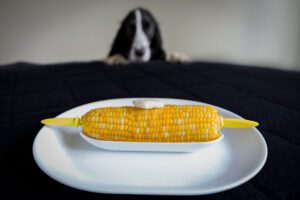Is Corn on the Cob Safe for Dogs?
Corn is a common food that many of us enjoy, especially during summer barbecues. But when it comes to our dogs, is corn on the cob a safe treat? This blog will explore whether dogs can safely eat corn cobs and what pet owners need to know to keep their pets healthy. If you have any concerns or need immediate assistance, call Animal Emergency Center of Tulsa at 918-665-0508.

Understanding Corn and Corn Cobs
Corn itself is not harmful to dogs and can be found in many dog foods and treats. However, corn on the cob presents a different set of risks. The cob can cause severe health problems for dogs if ingested. Let’s look closer at why the cob is dangerous and what can happen if a dog eats one.
The Risks of Corn Cobs
Corn cobs are hard and indigestible. If your dog chews on a cob, pieces can break off and become lodged in their throat or digestive tract. This can lead to choking, blockages, or even damage to the intestines. These situations often require emergency veterinary care. Always dispose of corn cobs in a way that your dog cannot access them.
Symptoms of Corn Cob Ingestion
It’s essential to recognize the signs that your dog may have swallowed a piece of corn cob. Knowing these symptoms can help you act quickly and seek veterinary care if necessary.
Common Symptoms to Watch For
- Vomiting: If your dog is vomiting repeatedly, it may be trying to expel a blockage.
- Lethargy: A lack of energy and unwillingness to move can indicate discomfort or pain.
- Loss of Appetite: If your dog refuses to eat, it could be a sign of a digestive issue.
- Abdominal Pain: Look for signs of discomfort when you touch your dog’s belly.
- Diarrhea: This can occur if the digestive system is irritated.
- Straining to Defecate: If your dog is having difficulty passing stool, it might be due to a blockage.
If you notice any of these symptoms, contact Animal Emergency Center of Tulsa immediately at 918-665-0508.
What to Do if Your Dog Eats a Corn Cob
If you suspect your dog has eaten a corn cob, take action right away. A quick response can make a significant difference in your pet’s health and recovery.
Steps to Take
- Stay Calm: Panicking can make it harder to help your dog.
- Check for Symptoms: Monitor your dog for any of the symptoms mentioned above.
- Do Not Induce Vomiting: Attempting to make your dog vomit could cause more harm.
- Contact a Vet: Call Animal Emergency Center of Tulsa at 918-665-0508 for advice and the next steps.
- Follow Professional Advice: Follow the guidance given by your veterinarian carefully.
Preventing Corn Cob Ingestion
Preventing access to corn cobs is the best way to protect your dog from this danger. Simple steps can help ensure your dog stays safe.
Tips for Prevention
- Proper Disposal: Always dispose of corn cobs in secure trash bins that your dog cannot access.
- Supervise During Meals: If you are eating corn on the cob, keep an eye on your dog to ensure it doesn’t snatch any leftovers.
- Educate Family Members: Make sure everyone in your household understands the risks and the importance of keeping corn cobs out of reach.
- Provide Safe Treats: Offer your dog safe and healthy treats that they can enjoy without risk.
Alternatives to Corn on the Cob
While corn cobs are dangerous, there are plenty of safe and healthy treats you can give your dog. Offering alternatives can satisfy your pet’s cravings without compromising their health.
Safe Treat Options
- Carrots: Raw or cooked carrots are a crunchy and nutritious treat.
- Apples: Remove the seeds and core, and your dog can enjoy this sweet fruit.
- Green Beans: Fresh or cooked green beans are low in calories and high in fiber.
- Pumpkin: Canned pumpkin (without added spices) can help with digestion.
These alternatives are safe and provide various health benefits for your dog. Always introduce new treats gradually and in moderation.
When to Call the Vet
Knowing when to seek veterinary care is crucial for your dog’s health. Even if your dog shows no immediate symptoms, it’s better to be cautious and consult with a vet if you suspect they’ve eaten a corn cob.
Signs You Should Not Ignore
- Persistent vomiting
- Severe abdominal pain
- Continuous lethargy
- Inability to defecate
Contact Animal Emergency Center of Tulsa at 918-665-0508 if you notice any of these signs or have any concerns about your dog’s health.
When You Need Us, We’ll be Here
Ensuring your dog’s safety is our top priority. By understanding the dangers of corn cobs and knowing how to respond, you can help keep your pet healthy and happy. If you have any questions or need assistance, please call Animal Emergency Center of Tulsa at 918-665-0508. We’re always here for you.
